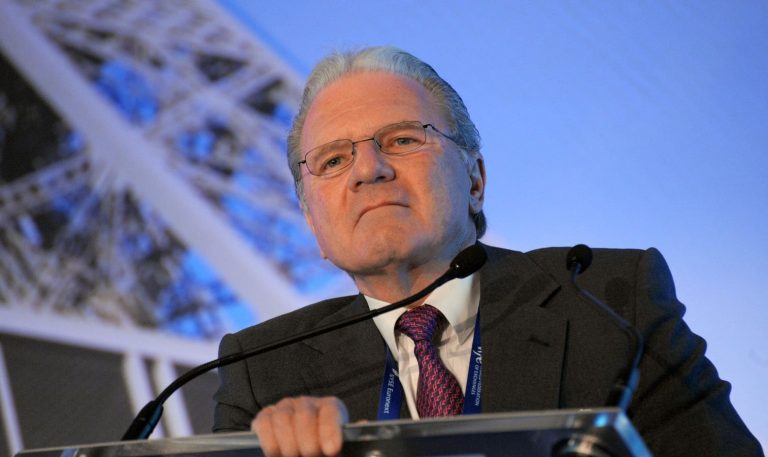Thomas Peterffy, founder and CEO of Interactive Brokers, listens to a question after addressing the World Federation of Exchanges (WFE) annual meeting in Paris on October 11, 2010. The WFE groups leading financial markets. AFP PHOTO ERIC PIERMONT / AFP PHOTO / Eric PIERMONT (Photo credit should read ERIC PIERMONT/AFP via Getty Images)
AFP via Getty Images
From Bill Ackman to Elon Musk, some of President Trump’s most enthusiastic billionaire boosters are publicly breaking with the president over Trump’s ‘reciprocal’ tariffs plan, which applied a base 10% levy to all countries and additional tariffs for countries with larger trade deficits.
Thomas Peterffy is the opposite: A tycoon who reluctantly and quietly backed each of Trump’s three presidential campaigns, but who now is all in on Trump’s controversial plan to enact tariffs on nearly every other country, upending the global economy and supply chains in the process.
“I think it gives an opportunity to many entrepreneurs to gear up for producing and inventing either the same things that foreign countries sell us at cheap prices, or proper substitutes for them,” Peterffy told Forbes via a video interview from his Palm Beach mansion on Tuesday afternoon. “Because the foreign products will be more expensive, we’ll become competitive internally with internal production.”
Peterffy, who lives three doors down from Trump’s Mar-a-Lago club, where he’s a paying member, says he has no patience for the billionaire turncoats who loved Trump until he unveiled his signature economic policy. “I think that they are short term, greedy, looking after their own pockets.”
Peterffy does not seem like a likely backer of Trump’s tariffs. A lifelong Republican in the establishment mold, he fled Hungary for the U.S. in 1965 at 21 years of age and became a dyed-in-the-wool capitalist on Wall Street trading commodities before founding Interactive Brokers, a trading platform used by retail and institutional investors, in 1993. His net worth of $45 billion makes him one of the 30 richest people in the world, according to Forbes’ Real-Time Billionaires List. In GOP megadonor circles, Peterffy – who has given over $32 million to various Republican candidates and PACs since 2000 – has carved a niche for himself as an arch critic of socialism and advocate of free-market policies. He has never publicly called for the U.S. to impose tariffs—until now.
“Do I believe in free markets? Yes, but I don’t think that these free markets have been free on the opposite side, because we’re competing with a lot of subsidies,” says Peterffy, who defended Trump’s slapdash formula for calculating tariffs on specific countries (dividing a country’s trade surplus by its total export value and then cutting that number in half). “I hope it is the plan,”says Peterffy. “I worry that when people feel that this is just a negotiating position and is going to change, then they will be less incentivized to gear up to produce substitutes.”
Fears of tariff-induced recession loom. Goldman Sachs economists told clients in a Sunday note the probability of a recession stood at 45%. JPMorgan economists provided 60% recession odds at the end of last week. Traders on Interactive Brokers’ prediction market ForecastTrader currently have the odds at 38%. But Peterffy says he isn’t worried about a potential recession: “[It] is going to take a lot of effort and investment and hiring and training new labor, putting in new machinery, building new factories. So it’s an economic boom.”
Stock market investors apparently disagree. The S&P 500 has fallen 12% across four consecutive trading sessions in the red, including Tuesday’s remarkable shedding of an intraday 4% gain, only to end with a loss of 1.6%. Despite the negative momentum, Peterffy says he believes markets have already bottomed out—on Monday morning. “I think markets are going up on the short term,” he says.
The billionaire also brushed off the impact of higher prices on lower-income consumers, arguing that essential goods and services will not become dramatically more expensive. “It is certainly not food, and it is not shelter, so you’re looking at plastic shit from China that is not absolutely necessary for people to have. These are not vital goods and services that you’re talking about,” Peterffy says. (Prices of imported foods like coffee, nuts and cheese are all expected to rise due to tariffs, as is the cost of housing construction.) He is equally sanguine about rising car prices: “I think [car companies] will eat some of the cost, and some [prices] will go higher, and more people will buy used cars, and it’s not going to be a huge impact.”
Peterffy’s embrace of Trump’s tariff logic is all the more remarkable, considering the tycoon’s on-again, off-again attitude toward the president. He supported Marco Rubio in the 2016 Republican primaries before backing Trump’s campaign in the general. He supported Trump again four years later, giving $250,000 to his reelection campaign, but did not defend him after the January 6 riots. “I am actually not a Trump fan at all. I hope he won’t run again,” he said in the summer of 2021. In the 2024 primaries he initially supported Ron DeSantis. When the Florida Governor’s campaign stumbled he led a short-lived effort to draft Virginia Governor Glen Youngkin to challenge Trump (which didn’t happen). Eventually, Peterffy lent his support to Trump, telling Forbes last October, on the eve of the election: “I will [vote for Trump] not because I like him, but I will always vote for a Republican candidate because I think that the worst thing that can happen to any nation is socialism.”
Asked if he has told Trump about his support for his tariffs amid the backlash from fellow billionaires, Peterffy pushed back. “I never try to get in touch with him,” he says, though acknowledges he’ll likely bump into Trump at Mar-A-Lago soon. “He comes over when he sees me. He always does. I don’t go to see him.”


